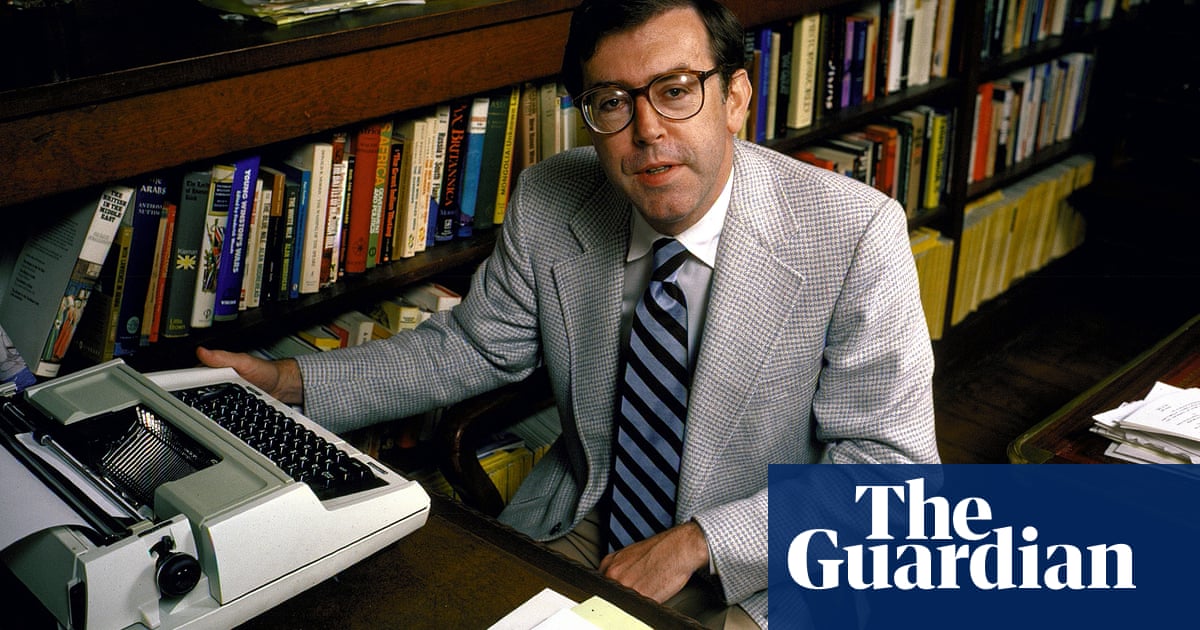
When Ipswich Town were a footballing power in the late 1970s and early 80s, Kevin Beattie was at the core of their success. A central defender of unusual poise and class, he was the best player in a team that not only won the FA and Uefa cups but gave the great Liverpool side of that era a run for their money in the league.
Beattie, who has died aged 64 of a heart attack, was hailed by Ipswich fans as the club’s greatest ever player. But a greater measure of his standing was the universal respect he generated among his peers, who recognised not just his great technical prowess but the courage, strength and application that went with it. His ability to win the ball and then distribute it with calm precision drew comparisons with Bobby Moore, and of his generation there were few English footballers more highly rated within the game.
Yet given the level of acclaim that came his way, Beattie played a surprisingly small number of games for England – nine in total. Injuries were mostly to blame; he was often forced to withdraw after being selected, and at 28 had to make an early retirement with a longstanding and serious knee problem. What he failed to achieve on the international stage, however, he made up for on the domestic front with Ipswich, in 225 league appearances across a highly successful decade for the side. He remained close to the club for the rest of his life, including for a number of years as a football analyst on BBC Radio Suffolk.
Despite his long affiliation with Ipswich, Beattie was born in Carlisle. His background was a poor one – his father, a coalman, and his mother, a cleaner, had nine children, and his father’s heavy drinking took up much of the household income, often meaning Kevin did not eat for two or three days running. He left St Patrick’s Roman Catholic senior school, where he occasionally played truant because he had no shoes to wear, at 14 to work in factory and warehouse jobs.
Spotted by a scout playing in local leagues, at 15 Beattie was invited to talks with the Liverpool manager Bill Shankly, but when he arrived in the city the club had forgotten to send anyone to meet him, and with no money to get to the ground he returned on the first train home. Shortly afterwards Ipswich jumped in to exploit Liverpool’s missed opportunity and their manager, Bobby Robson, is said to have told his chief scout that he would lose his job if he failed to rendezvous with the youngster. Beattie turned up at the interview wearing his father’s shoes, and when Ipswich signed him as an apprentice in 1970, Robson’s first act was to make sure he was properly shod.
Beattie turned professional in 1971 and the following year made his debut, aged 18, in a 2-1 win against Manchester United. He was the inaugural winner of the Professional Footballers’ Association (PFA) Young Player of the Year award in 1974, and was playing for England – in a 5-0 win against Cyprus – by 1975.
Immensely strong, athletic, and extremely quick over the first 10 yards, Beattie was a superb tackler, could spring impressively high when heading the ball, and had a powerful left-footed shot. “He was quite annoying, really, because everything came so easy for him,” said his Ipswich colleague Roger Osborne. “He was just stronger, fitter and better than anyone else. He didn’t have to try.”In the season before Beattie’s debut, Ipswich were placed 13th in the First Division, but in all but one of the nine campaigns in which he featured, the club finished no worse than sixth, including runners-up to Aston Villa in 1980-81. With Beattie in the side they also won the FA Cup final in 1978 – a 1-0 victory against Arsenal, courtesy of an Osborne goal – and while he did not play in the two legs of the 5-4 Uefa Cup final victory over the Dutch club AZ Alkmaar three years later, he was eventually awarded a medal by Uefa to recognise his contributions earlier in the competition.
He had played in what turned out to be his last match for Ipswich shortly before that final, when he broke his arm in an FA Cup semi-final against Manchester City. By then, years of problems with his knees had already taken their toll, ending his England career in 1977 and increasingly interfering with his club availability. After the fifth in a series of unsuccessful operations in 1981 Beattie was forced to call time with Ipswich at the end of the year.
He tried short-lived comebacks in lower leagues with Colchester United and Middlesbrough during 1982-83, then moved into non-league football in the mid-80s, interspersed with brief periods at three minor teams in Scandinavia.
Despite having received £50,000 from a testimonial match with Ipswich and a fee for acting as Michael Caine’s body double in the football sequences of the 1981 film Escape to Victory, Beattie lived for much of the rest of his life in straitened circumstances. In recent years, however, he had received financial help from the PFA and had put his life on a more even keel, acting as a full-time carer to his wife, Margaret, as her multiple sclerosis worsened.
Affable and down to earth even at the height of his fame, Beattie remained a popular figure in Ipswich, and returned to the public eye through his matchday work on local radio from 2008 onwards. In 2012 he was given a 12-week curfew as punishment for benefit fraud, having failed to declare his modest radio earnings for fear that he would lose income support.
He is survived by Margaret (nee Boldy), whom he married in the early 70s, and by their three daughters, Emma, Sarah and Louise. The Guardian Sport












